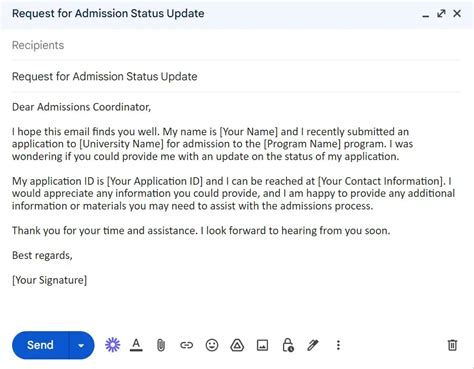As you embark on your academic journey, you may wonder if you have access to your admission file. This document contains detailed information about your application, including your transcript, test scores, and personal statement. While access may vary depending on the institution, understanding your rights and navigating the procedures is crucial.

Your Right to Access Admission Files
The Family Educational Rights and Privacy Act (FERPA) of 1974 grants you the right to inspect and review your educational records, including your admission file. This law applies to all educational institutions that receive federal funding.
Exceptions:
- FERPA does not allow you to access confidential letters of recommendation or confidential information that could harm another person.
- Institutions can withhold admissions decisions until you enroll.
How to Request Your Admission File
If you wish to access your admission file, you should:
- Contact the Admissions Office: Submit a written request to the admissions office of the institution you applied to or currently attend.
- Provide Identifying Information: Clearly indicate your full name, student ID number, and the academic year for which you are requesting the file.
- Pay Fees (Optional): Some institutions may charge a reasonable fee for copying and mailing your file.
When to Request Your Admission File
- During Enrollment: You may request your file after you have accepted your offer of admission.
- Post-Enrollment: You can request your file at any time during your enrollment.
- After Graduation: You have the right to access your file for a reasonable period after graduating.
Benefits of Accessing Your Admission File
- Understand your application: Review the reasons why you were admitted or rejected.
- Identify areas for improvement: Analyze your transcripts and test scores to identify areas where you can enhance your academic performance.
- Plan for the future: Use the information in your file to make informed decisions about your academic and career goals.
Tips and Tricks
- Be clear and concise: When requesting your file, be specific about the time period and information you seek.
- Allow sufficient time: Institutions may take several weeks to process your request.
- Follow up regularly: If you do not receive a response, follow up with the admissions office.
Common Mistakes to Avoid
- Waiting too long: Requesting your file after graduation may limit your access.
- Requesting confidential information: FERPA prohibits access to confidential letters of recommendation.
- Misinterpreting the file: Seek clarification from the admissions office if you have any questions about the file’s contents.
Conclusion
Understanding your rights under FERPA and requesting your admission file can provide valuable insights into your academic journey. By following the procedures outlined in this article, you can access this important document and make informed decisions about your future.
